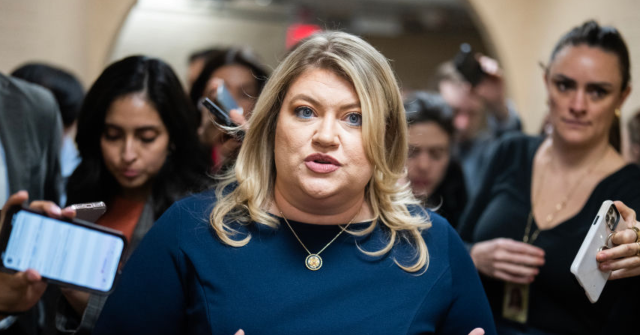Rep. Kat Cammack (R-FL) told Breitbart News in an interview that Apple and Google have done a lot to monetize their predominance in the app store marketplace, yet they have still not moved to safeguard consumers or protect kids online.
In May, Cammack introduced the App Store Freedom Act (ASFA), a bill that seeks to promote competition and protect consumers while allowing developers in the mobile app marketplace to prosper.
The legislation would require large app stores with more than 100 million American users, or the Apple App Store and the Google Play Store, to allow users to set third-party apps or app stores as the default. ASFA would stipulate that developers would have equal access to interfaces, features, and development tools without cost or discrimination.
Cammack, in an interview with Breitbart News, described Apple and Google’s market dominance as un-American.
She said, “Competition is the cornerstone of the American economy. It is anyone who is arguing for a monopoly in the United States needs to take a history lesson, and it’s not every day that you see Republicans and Democrats agreeing on this issue, on many issues.”
Cammack continued, “They spend billions of dollars in developing ways to monetize users and their data, because, let’s be honest, the currency of the future, it’s data, right? But they have not invested that same amount of time, attention, and resources in safeguarding consumers or protecting kids online, right?”
The Florida conservative added, “Apple is still targeting them [children] with pornographic ads and chat ads and things like that that are not good for kids. Or from the national security standpoint, Apple allows 60-plus different Chinese military developed VPN apps to be on their store.”
She added that there are “countless examples” where Apple and Google have delayed publishing developers’ apps only to “magically” unload their preferred app on the app store.
Conservatives, consumer advocates, and tech experts wrote to House Energy and Commerce Committee Chairman Brett Guthrie (R-KY), urging him to back the legislation.
The letter, led by Joel Thayer, the president of the Digital Progress Institute, stated:
For more than a decade, Apple and Google have monopolized the mobile app ecosystem through the App Store and Play Store. Without meaningful competition, these firms have continually failed to protect children from sexual exploitation, exposure to obscenity, abuse of their data, and more. In parallel, Apple and Google have fought to prevent competition under the premise that their monopolies are safe for children. The argument is not only cynical — it is belied by these tech giants’ own terrible track record on safety and privacy.
…
Prior investigations have similarly concluded that Apple’s App Store is a “mass distributor of risky and inappropriate apps to children.” Indeed, one of Apple’s own engineers called Apple “the greatest platform for distributing child porn” and that “child predator grooming” was an “under-resourced challenge.” For example, Apple’s review process failed to detect “nudify apps” that enabled users to create non-consensual sexual imagery. And only after mounting public pressure did the company take action and remove the apps from the App Store.
“The bipartisan App Store Freedom Act would enable much-needed alternatives to flourish, including app stores that actually live up to the standards that Google and Apple claim to uphold,” the coalition added. “Importantly, this legislation would allow parents to delete or hide the Google Play Store or Apple App Stores from their children’s phones and designate a different app store the default. This would empower parents, for instance, to ensure their children are only accessing app stores that include safe and educational content.”
X, formerly known as Twitter, also joined the Coalition for App Fairness to ensure a more fair and open app marketplace.
Cammack added, “There is no competition. Apple and Google control the entire marketplace and with no pressure and no competition. There’s no push to improve, make these changes, protect consumers. None of that happens when you have a monopoly, and that’s effectively what they’ve got.”


